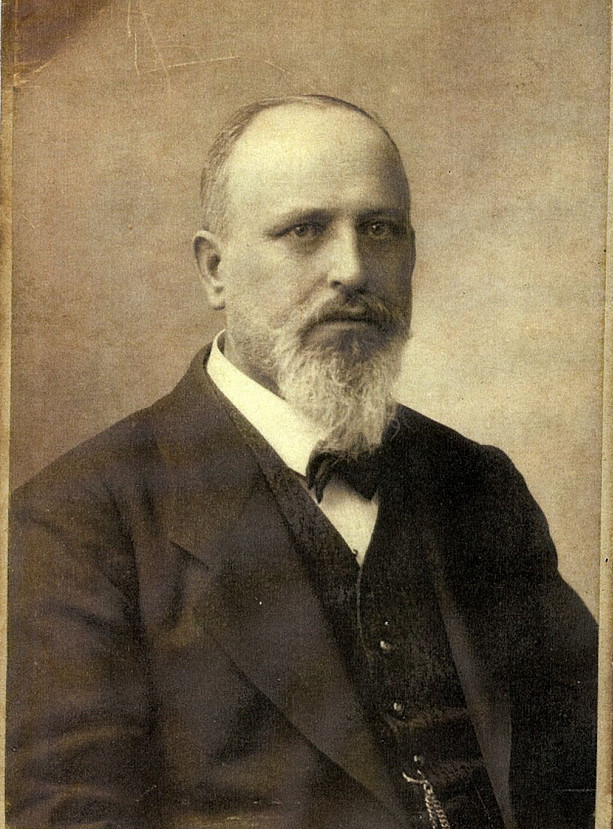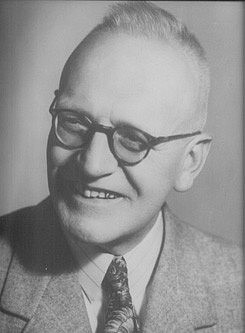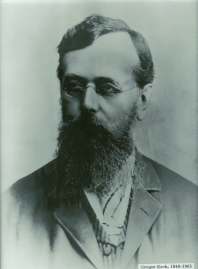
©Bibliothekszentrum Wall
In 1870, the Slavicist Gregor Krek (1840-1905) was appointed the first professor of Slavic philology at the University of Graz, who, initially as an associate professor and from 1875 as a full professor, filled a gap in comparative historical linguistics at the university with Slavic research with a regional focus on Slavic Styria.
In 1896, the Slavicist and Miklošič student Karel Štrekelj (1859-1912) was appointed associate professor of ‘Slavic philology with special emphasis on the Slovenian language and literature’. Štrekelj worked on Slovenian dialect research, lexicology and folk poetry. His monumental edition of Slovenian folk poetry was long regarded as a prime example of the academic treatment of oral literature. He was appointed a full professor in 1908.
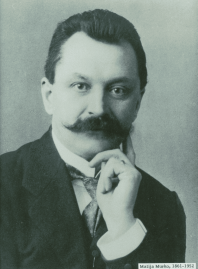
©Bibliothekszentrum Wall
Matija Murko (1861-1952), who succeeded Krek in the chair of Slavic philology, made a name for himself with his work on older South Slavic literature. His methods for investigating Balkan Slavic folk epics were regarded as groundbreaking. Murko was a member of the editorial board of the cultural-historical journal "Wörter und Sachen", founded by Rudolf Meringer. In 1917 he accepted a call to Leipzig, and from 1920 he took up the chair for South Slavic languages and literatures at Charles University in Prague.

©Bibliothekszentrum Wall
Rajko Nahtigal (1877-1958) became an associate professor of Slavic philology at the University of Graz in 1913. Until his appointment to the University of Ljubljana, which he co-founded in 1919, he researched the history of the Slovenian language and the Freisinger Denkmäler, the oldest evidence of the Slovenian language and a Slavic language in Latin script, as well as many other linguistic monuments such as the so-called Igorlied.
In 1923, after both professorships had been vacant for several years, the Leipzig Slavicist and legal historian Heinrich Felix Schmid (1896-1963) was appointed to the Chair of Slavic Philology as an associate professor. He worked on comparative Slavic legal history and legal terminology, from 1929 until his dismissal in 1938 as full professor of Eastern European history. He resumed his teaching activities in 1945 and was appointed Professor of Eastern European History at the University of Vienna in 1948.
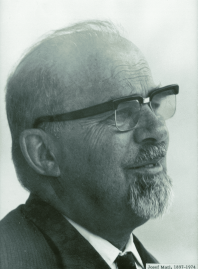
©Bibliothekszentrum Wall
The Slavicist and Southeast European researcher Josef Matl (1897-1974) was head of the Department of Slavic Philology, later the Institute of Slavic Studies, from 1948 to 1968. Matl, who taught at the University of Graz from 1928 as a lecturer, later as an associate professor and from 1954 as a full professor, devoted himself to Southeastern research and wrote fundamental works such as Europa und die Slawen (1964) and Die Kultur der Südslawen (1966). His extensive academic legacy and specialist correspondence are kept at the Institute of Slavic Studies.

©Bibliothekszentrum Wall
The paleo-Slavist Linda Sadnik (1910-1998), who researched cultural interdependencies in the eastern Mediterranean region and the folklore of south-eastern Europe, was the first woman to teach Slavic studies in Graz from 1941. In 1968, Sadnik, who initially followed an appointment to Saarbrücken in 1959, became the first female professor at Graz Slavic Studies and a pioneer of new approaches in language history research. Sadnik moved the editorial office of the Anzeiger für slavische Philologie, founded in 1966 together with her husband, the Slavicist Rudolf Aitzetmüller, to Graz.
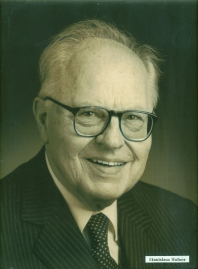
©Bibliothekszentrum Wall
Stanislaus Hafner (1916-2006) was appointed to the re-established second chair of Slavic Studies as an associate professor in 1964, which was elevated to a full professorship in 1967, which he held until 1987. Hafner researched the Slavic language, literature and culture in Austria, the history of Austrian Slavic studies, the Serbian Middle Ages and his teacher N. S. Trubetzkoy. Together with Erich Prunč, he initiated the internationally acclaimed long-term project to research the Slovene vernacular in Carinthia, with the Thesaurus of the Slovene Vernacular in Carinthia (1982-2012) as the central sub-project.
Harald Jaksche (1933-2014), who studied Slavic Studies at the University of Graz, worked at German and Swiss universities (Saarbrücken, Mannheim, Fribourg, Bern) between 1968 and 1978 before being appointed to Graz. He researched Old Bulgarian, language history and the history of the Slovenian accent, and during his time in Graz, which lasted until 1989, he worked on text semantics (together with Michael Metzeltin) and phraseology (with Harald Burger and Ambros Sialm).
Begin of page section:
Additional information:
End of this page section. Go to overview of page sections
End of this page section. Go to overview of page sections

